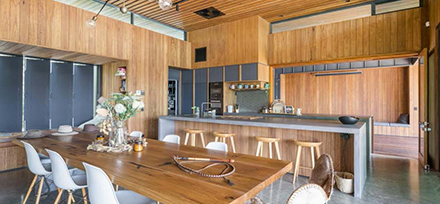Boral Timber has stated that this year has presented enormous challenges to the community as a whole after suffering through bushfires, floods and the ongoing global pandemic, and the local timber industry is also taking stock. Source: Timberbiz
The company says that as the shop local movement gains significant momentum around the country, driving more conscious buying decisions, now is more timely than ever to encourage architects, designers and consumers to consider the importance of buying Australian-made timbers for their interior and exterior projects.
“Boral is proud of to be a manufacturer of beautiful products that showcase Australian hardwoods, made in Australia by Australian workers,” Leon Travis, general manager of sales and distribution, Boral Timber said.
“Like other long-standing names in the flooring and decking industry, we know how vital local manufacturing and investment in regional communities can be.”
Boral has a strong presence on the northern and southern coasts of New South Wales, with manufacturing sites in country towns, such as Kyogle and Narooma.
Boral Timber employs approximately 70 workers permanently at the sawmill in Kyogle, which is a significant number in such a small town.
The business is 95% Australian-made and Australian-sold and manufactures all products locally, except its engineered flooring.
“We have never abandoned our roots – we are still heavily invested in domestic production and manufacturing,” Mr Travis said.
“In recent years, Australia has become vulnerable to growing volumes of imported flooring and decking. We are not just a service industry, manufacturing is important, and we now have a chance to showcase our domestic production capabilities to those seeking out local building materials. It is likely that consumers would be unaware that most of our products are made here. This is an opportunity to educate the public and encourage consumers to place more value on origins and quality.”
Free-trade agreements between Australia and foreign countries have contributed to a significant drop in the volume of Australian flooring products sold over the past 10 years. This erosion has been challenging for the industry.
“Australian timber products have not been the trend because they have not been promoted as aggressively as oak and similar imported timber varieties. I believe we will start to see a shift away from some of these imported products. Anecdotally, a growing number of people are beginning to question the true value of these goods,” Mr Travis said.
“Of course, buyer decisions are heavily influenced by architects, flooring specialists and builders. Consumers have an idea of what they want the floor to look like and then they put their trust in the professionals to make the final decision. Those who have joined the design fraternity in the last decade would not have an intimate knowledge of Australian products and species.
“Promoting and specifying Australian species, such as Blackbutt and Spotted Gum, supports Australian companies, regional communities and local employment.”
With many younger architects and designers looking for more environmentally sustainable products, Australian-made timber is the natural choice for flooring and decking. Australian forests are protected by strict Federal and State controls and regulations ensuring that there is a healthy balance between long term conservation and sustainable forestry management.
All Boral Timber manufacturing sites are Chain of Custody certified, meeting the Responsible Wood Australian Standard 4707. Consumers can rest assured that the timber used for their hardwood flooring and decking has been sourced from certified, legal and sustainably managed sources.
The beauty of Australian hardwoods cannot be replicated. Supporting Australian-made products will ensure local timber manufacturing remains viable and continues to support regional workforces, and the industry as a whole.






